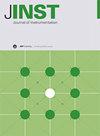精确康普顿偏振实验中QED校正引起的系统不确定度的定量研究
IF 1.3
4区 工程技术
Q3 INSTRUMENTS & INSTRUMENTATION
引用次数: 0
摘要
几个新的高能物理加速器将利用光束偏振作为其计划的核心部分。在一些情况下,光束偏振需要精确地测量,精度高于每英里1。在这种精度水平上,必须考虑α 3 QED校正。在本文中,我们估计了几个项目中考虑的探测器的相关校正,如ILC和FCC-ee。研究了两种不同的提取光束偏振的技术,发现它们提供了互补的信息。相关的测量受到系统不确定性的不同来源的支配,这些不确定性要么与QED修正有关,要么可能与每英里水平上实验条件的不受控制的变化有关。特别发现,除了实验挑战外,光子空间分布的测量比测量电子空间和能量分布的技术对QED校正更敏感。本文章由计算机程序翻译,如有差异,请以英文原文为准。
A quantitative study of systematic uncertainties due to QED corrections in accurate Compton polarimetry experiments
Abstract Several new high-energy physics accelerators will exploit beam polarization as a core part of their program. In several cases the beam polarization needs to be accurately measured with a precision better than one per-mille. At this level of precision, α 3 QED corrections must be accounted for. In this paper, we estimate the related correction for the detectors considered for several projects as ILC and FCC-ee. Two different techniques to extract the beam polarization are investigated and found to provide complementary information. The related measurements are dominated by different sources of systematic uncertainties, either related to QED corrections or likely to uncontrolled variations of experimental conditions at the per-mille level. It is found in particular that the measurement of the spatial distribution of photons, besides experimental challenges, is more sensitive to QED corrections than the technique consisting in measuring electrons spatial and energy distribution.
求助全文
通过发布文献求助,成功后即可免费获取论文全文。
去求助
来源期刊

Journal of Instrumentation
工程技术-仪器仪表
CiteScore
2.40
自引率
15.40%
发文量
827
审稿时长
7.5 months
期刊介绍:
Journal of Instrumentation (JINST) covers major areas related to concepts and instrumentation in detector physics, accelerator science and associated experimental methods and techniques, theory, modelling and simulations. The main subject areas include.
-Accelerators: concepts, modelling, simulations and sources-
Instrumentation and hardware for accelerators: particles, synchrotron radiation, neutrons-
Detector physics: concepts, processes, methods, modelling and simulations-
Detectors, apparatus and methods for particle, astroparticle, nuclear, atomic, and molecular physics-
Instrumentation and methods for plasma research-
Methods and apparatus for astronomy and astrophysics-
Detectors, methods and apparatus for biomedical applications, life sciences and material research-
Instrumentation and techniques for medical imaging, diagnostics and therapy-
Instrumentation and techniques for dosimetry, monitoring and radiation damage-
Detectors, instrumentation and methods for non-destructive tests (NDT)-
Detector readout concepts, electronics and data acquisition methods-
Algorithms, software and data reduction methods-
Materials and associated technologies, etc.-
Engineering and technical issues.
JINST also includes a section dedicated to technical reports and instrumentation theses.
 求助内容:
求助内容: 应助结果提醒方式:
应助结果提醒方式:


